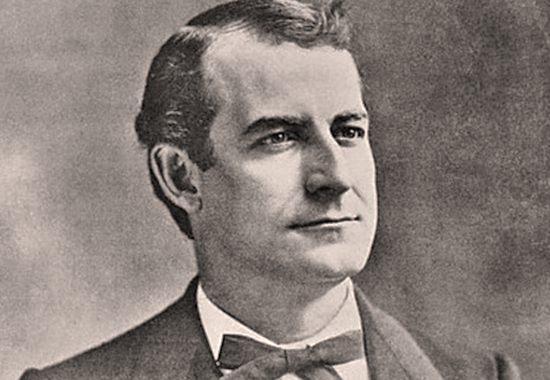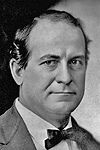|

PROMOTING ALTRUISM -
WILLIAM JENNINGS BRYAN 1906
The White Man's Burden

 |
Our English
friends, under whose flag we meet tonight,
recalling |
that this is the
anniversary of our nation's birth, would
doubtless pardon us if our rejoicing contained
something of self-congratulation, for it is at
such times as this that we are wont to review
those national achievements which have given to
the United States its prominence among the
nations.
But I hope I shall not be thought lacking in
patriotic spirit if, instead of drawing a
picture of the past, bright with heroic deeds
and unparalleled in progress, I summon you
rather to a serious consideration of the
responsibility resting upon those nations which
aspire to premiership.
This line of
thought is suggested by a sense of propriety as
well as by recent experiences. By a sense of
propriety because such a subject will interest
the Briton as well as the American, and by
recent experiences because they have impressed
me not less with our national duty than with the
superiority of Western over Eastern
civilization.
Asking your attention to such a theme, it is not
unfitting to adopt a phrase coined by a poet to
whom America as well as England can lay some
claim, and take for my text The White Man's
Burden.
Take up the White Man's burden
In
patience to abide
To veil the threat of terror
And check the show of pride;
By
open speech and simple
An hundred times made plain
To seek another's profit
And work another's gain.
Thus sings
Kipling, and, with the exception of the third
line of the meaning of which I am not quite
sure, the stanza embodies the thought which is
uppermost in my mind tonight.
No one can travel
among the dark-skinned races of the Orient
without feeling that the white man occupies an
especially favored position among the children
of men, and the recognition of this fact is
accompanied by the conviction that there is a
duty inseparably connected with the advantages
enjoyed.
There is a white
man's burden, a burden which the white man
should not shirk even if he could, a burden
which he could not shirk even if he would. That
no one "liveth unto himself or dieth unto
himself" has a national as well as an individual
application. Our destinies are so interwoven
that each exerts an influence directly or
indirectly upon all others.
Among the blessings which the Christian nations
are at this time able, and in duty bound, to
carry to the rest of the world, I may mention
five: education, knowledge of the science of
government, arbitration as a substitute for war,
appreciation of the dignity of labor, and a high
conception of life.
In India, in the Philippines, in Egypt, and even
in Turkey, statistics show a gradual extension
of education, and I trust I will be pardoned if
I say that neither the armies nor the navies,
nor yet the commerce of our nations, have given
us so just a claim to the gratitude of the
people of Asia as have our schoolteachers, sent,
many of them, by private rather than by public
funds.
The Christian nations must lead the movement for
the promotion of peace not only because they are
enlisted under the banner of the Prince of
Peace, but also because they have attained such
a degree of intelligence that they can no longer
take pride in a purely physical victory.
Our country has reason to congratulate itself
upon the success of President Roosevelt in
hastening peace between Russia and Japan.
Through him our nation won a moral victory more
glorious than a victory in war. King Edward has
also shown himself a promoter of arbitration,
and a large number of members of Parliament are
enlisted in the same work. It means much that
the two great English speaking nations are thus
arrayed on the side of peace.
Society has passed through a period of
aggrandizement, the nations taking what they had
the strength to take and holding what they had
the power to hold. But we are already entering a
second era, an era in which the nations discuss
not merely what they can do, but what they
should do, considering justice to be more
important than physical prowess. In tribunals
like that of The Hague the chosen
representatives of the nations weigh questions
of right and wrong, and give a small nation an
equal hearing with great and a decree according
to conscience. This marks an immeasurable
advance.
But is another step yet to be taken? Justice
after all is cold and pulseless, a negative
virtue. The world needs something warmer, more
generous. Harmlessness is better than
harmfulness, but positive helpfulness is vastly
superior to harmlessness, and we still have
before us a larger, higher destiny of service.
Even now there are signs of the approach of this
third era, not so much in the actions of
governments as in the growing tendency of men
and women in many lands to contribute their
means, in some cases their lives, to the
intellectual, moral awakening of those who sit
in darkness. Nowhere are these signs more
abundant than in our own beloved land. Before
the sun sets on one of these new centers of
civilization it arises upon another.
While in America and in Europe there is much to
be corrected and abundant room for improvement,
there has never been so much altruism in the
world as there is today, never so many who
acknowledge the indissoluble tie that binds each
to every other member of the race. I have felt
more pride in my own countrymen than ever before
as I have visited the circuit of schools,
hospitals, and churches which American money has
built around the world. The example of the
Christian
nations, though but feebly reflecting the light
of the Master, is gradually reforming society.
On the walls of the temple at Karnak an ancient
artist carved a picture of an Egyptian king. He
is represented as holding a group of captives by
the hair, one hand raising a club as if to
strike them. No king would be willing to confess
himself
so cruel today. In some of the capitals of
Europe there are monuments built from, or
ornamented with, cannon taken in war. That form
of boasting is still tolerated, but let us hope
that it will in time give way to some emblem of
victory which will imply helpfulness rather than
slaughter.

More History
|
|